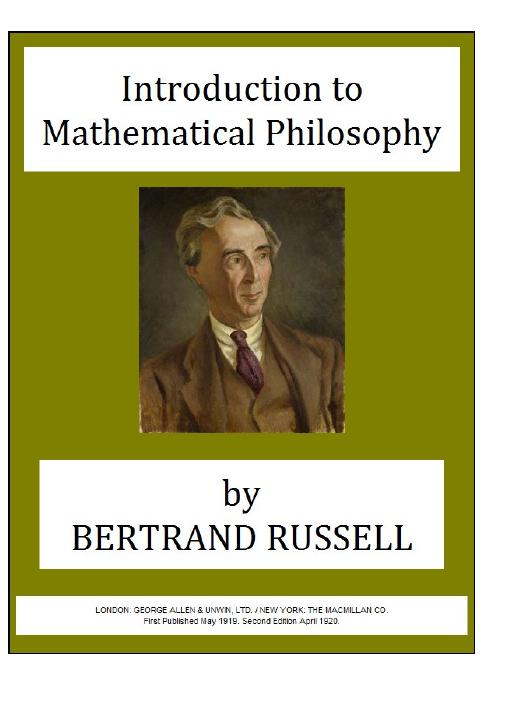Introduction to Mathematical Philosophy by Bertrand Russell

Author:Bertrand Russell [Russell, Bertrand]
Language: eng
Format: epub, pdf
CHAPTER XII: SELECTIONS AND THE MULTIPLICATIVE AXIOM
[page 117] In this chapter we have to consider an axiom which can be enunciated, but not proved, in terms of logic, and which is convenient, though not indispensable, in certain portions of mathematics. It is convenient, in the sense that many interesting propositions, which it seems natural to suppose true, cannot be proved without its help; but it is not indispensable, because even without those propositions the subjects in which they occur still exist, though in a somewhat mutilated form.
Before enunciating the multiplicative axiom, we must first explain the theory of selections, and the definition of multiplication when the number of factors may be infinite.
In defining the arithmetical operations, the only correct procedure is to construct an actual class (or relation, in the case of relation-numbers) having the required number of terms. This sometimes demands a certain amount of ingenuity, but it is essential in order to prove the existence of the number defined. Take, as the simplest example, the case of addition. Suppose we are given a cardinal number μ, and a class α which has μ terms. How shall we define μ+μ? For this purpose we must have two classes having μ terms, and they must not overlap. We can construct such classes from α in various ways, of which the following is perhaps the simplest: Form first all the ordered couples whose first term is a class consisting of a single member of α, and whose second term is the null-class; then, secondly, form all the ordered couples whose first term is [page 118] the null-class and whose second term is a class consisting of a single member of α. These two classes of couples have no member in common, and the logical sum of the two classes will have μ+μ terms. Exactly analogously we can define μ+ν, given that μ is the number of some class α and ν is the number of some class β.
Such definitions, as a rule, are merely a question of a suitable technical device. But in the case of multiplication, where the number of factors may be infinite, important problems arise out of the definition.
Multiplication when the number of factors is finite offers no difficulty. Given two classes α and β, of which the first has μ terms and the second ν terms, we can define μ×ν as the number of ordered couples that can be formed by choosing the first term out of α and the second out of β. It will be seen that this definition does not require that α and β should not overlap; it even remains adequate when α and β are identical. For example, let α be the class whose members are x1, x2, x3. Then the class which is used to define the product μ×μ is the class of couples:
(x1, x1), (x1, x2), (x1, x3); (x2, x1), (x2, x2), (x2, x3); (x3, x1), (x3, x2), (x3, x3).
This definition remains applicable when μ or ν or both are infinite, and it can be extended step by step to three or four or any finite number of factors.
Download
Introduction to Mathematical Philosophy by Bertrand Russell.pdf
This site does not store any files on its server. We only index and link to content provided by other sites. Please contact the content providers to delete copyright contents if any and email us, we'll remove relevant links or contents immediately.
| Algebra | Calculus |
| Combinatorics | Discrete Mathematics |
| Finite Mathematics | Fractals |
| Functional Analysis | Group Theory |
| Logic | Number Theory |
| Set Theory |
Modelling of Convective Heat and Mass Transfer in Rotating Flows by Igor V. Shevchuk(6430)
Weapons of Math Destruction by Cathy O'Neil(6260)
Factfulness: Ten Reasons We're Wrong About the World – and Why Things Are Better Than You Think by Hans Rosling(4729)
A Mind For Numbers: How to Excel at Math and Science (Even If You Flunked Algebra) by Barbara Oakley(3293)
Descartes' Error by Antonio Damasio(3270)
Factfulness_Ten Reasons We're Wrong About the World_and Why Things Are Better Than You Think by Hans Rosling(3230)
TCP IP by Todd Lammle(3177)
Fooled by Randomness: The Hidden Role of Chance in Life and in the Markets by Nassim Nicholas Taleb(3104)
Applied Predictive Modeling by Max Kuhn & Kjell Johnson(3063)
The Tyranny of Metrics by Jerry Z. Muller(3056)
The Book of Numbers by Peter Bentley(2960)
The Great Unknown by Marcus du Sautoy(2687)
Once Upon an Algorithm by Martin Erwig(2640)
Easy Algebra Step-by-Step by Sandra Luna McCune(2625)
Lady Luck by Kristen Ashley(2574)
Police Exams Prep 2018-2019 by Kaplan Test Prep(2540)
Practical Guide To Principal Component Methods in R (Multivariate Analysis Book 2) by Alboukadel Kassambara(2535)
All Things Reconsidered by Bill Thompson III(2388)
Linear Time-Invariant Systems, Behaviors and Modules by Ulrich Oberst & Martin Scheicher & Ingrid Scheicher(2361)
